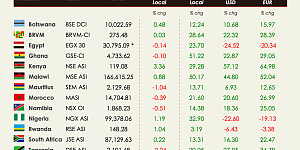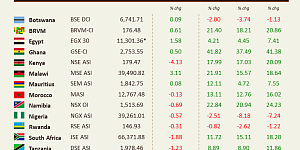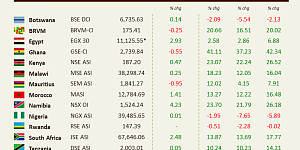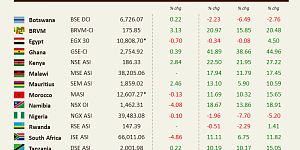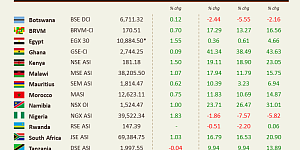Weeks come and go and are more or less alike on global markets. Extraordinary times called for extraordinary measures as ECB’s President surpassed investors’ expectations by cutting all three main interest rates and increasing monthly asset purchases to a higher-than-hoped 80 billion euros. The move triggered buying across emerging markets, which benefit from low borrowing costs in developed nations as investors seek higher returns in riskier assets. The excitement was quickly contained and the volatility maintained when during his press conference Draghi stated that the ECB was not planning further interest rate cuts sending stocks lower Thursday before a new rally on Friday as investors digested the news.
The first will be last and the last the first… On African markets weeks come and go and each is different.
The EGX 30 showed a solid performance and soared by 7.79%. After struggling with a foreign currency shortage that has harmed economic growth and corporate profits, Egypt is now trying to win back part of the $10 billion of overseas investment in government treasury bills that took off as a consequence of the Arab Spring. The central bank removed caps on foreign-currency withdrawals and deposits for individuals and for importers of basic goods. The country is planning to provide a product for foreign investors in its domestic government debt to hedge against currency risk. This move is a sign of progress towards solving the foreign-currency crisis and was, rightly so, positively welcomed by the market.
The BRVM-CI increased by 3.05%. The index has been attracting investors interested in assets like companies in the service sector and banks which tend to be generous in their shareholder remunerations.
The JSE-ASI declined by 0.88%. After Barclays Plc’s it is now Old Mutual’s turn to announce a restructuring of its businesses. While the Company said it will spin off its 54% controlling stake in Johannesburg-based Nedbank Group to shareholders, it gave little detail on its plans for its emerging-market business, which is run from South Africa, as well as its U.S.-based OM Asset Management business and its U.K. wealth operations. The CEO said it would consider an initial public offering for some assets. This says a lot about the state of the economy and companies having to face a tougher environment. Time will tell whether this marks the start of a series of downsizing as South Africa is facing a potential downgrade to junk status, a weakening currency, inflation that is accelerating and interest rates at a six-year high.
Earlier in the week, in an attempt to weather the economic storm, President Jacob Zuma went to Nigeria in order to expand trade and investment ties. Such alliance, particularly in non-commodity products, could bring midterm benefits as this tends to come hand in hand with faster productivity growth and more rapid rises in incomes, something both economies need right now.
NSE ASI decreased by 1.35% this week as Equity Group Holdings Ltd., owner of Kenya’s biggest lender by market value, posted earnings below market expectations of double-digit growth. Weaker currencies weighed on its regional operations as well as loan-losses. These higher credit costs are due to the central bank’s increase of Kenya’s main lending rate by 300 basis points to 11.5% to curb accelerating inflation and a weakening currency last year.





